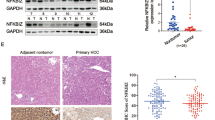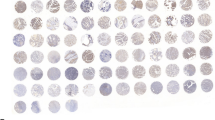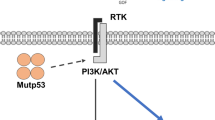Abstract
Breast cancer has a high incidence in the world and is becoming a leading cause of death in female patients due to its high metastatic ability. High expression of Notch-1 and its ligand Jagged-1 correlates with poor prognosis in breast cancer. Our previous work has shown that Notch-1 signaling pathway upregulates NF-κB transcriptional activity and induces the adhesion, migration and invasion of human breast cancer cell line MDA-MB-231. However, the role of Notch-1 in NF-κB activation is still poorly understood. Here, we aim to understand the exact mechanism that Notch-1 regulates NF-κB activity. In MDA-MB-231 cells where Notch-1 is constitutively activated, the phosphorylation of p85 and AKT (Tyr308/Ser473) is upregulated, indicating PI3K/AKT pathway is activated. Notch-1 activation caused the increase of PP2A phosphorylation at Tyr307, indicating Notch-1 inhibits PP2A activity. NF-κB transcriptional activity was evaluated by dual-luciferase reporter assay, and the results showed that, while silencing of Notch-1, PP2A activity was upregulated and NF-κB activity was downregulated, whereas PP2A inhibitor okadaic acid (OA) restored NF-κB activity. Immunofluorescence and Western blots showed that OA treatment antagonized the decrease of p65 nuclear translocation caused by Notch-1 silencing. Moreover, OA treatment also upregulated MMP-2, MMP-9 and VEGF mRNA expression levels, indicating OA rescues Notch-1 silencing that caused low cell invasion. Taken together, our results suggest that Notch-1-activating PI3K/AKT/NF-κB pathway is PP2A dependent; PP2A may be a potential therapeutic target in breast cancer.






Similar content being viewed by others
References
Chen W, Zheng R, Zeng H, Zhang S. The updated incidences and mortalities of major cancers in China, 2011. Chin J Cancer. 2015;34(3):53. doi:10.1186/s40880-015-0042-6.
Siegel RL, Miller KD, Jemal A. Cancer statistics, 2015. CA Cancer J Clin. 2015;65(1):5–29. doi:10.3322/caac.21254.
Boggs AE, Vitolo MI, Whipple RA, Charpentier MS, Goloubeva OG, Ioffe OB, et al. alpha-Tubulin acetylation elevated in metastatic and basal-like breast cancer cells promotes microtentacle formation, adhesion, and invasive migration. Cancer Res. 2015;75(1):203–15. doi:10.1158/0008-5472.CAN-13-3563.
Reedijk M, Odorcic S, Chang L, Zhang H, Miller N, McCready DR, et al. High-level coexpression of JAG1 and NOTCH1 is observed in human breast cancer and is associated with poor overall survival. Cancer Res. 2005;65(18):8530–7. doi:10.1158/0008-5472.CAN-05-1069.
Bajaj J, Maliekal TT, Vivien E, Pattabiraman C, Srivastava S, Krishnamurthy H, et al. Notch signaling in CD66+ cells drives the progression of human cervical cancers. Cancer Res. 2011;71(14):4888–97. doi:10.1158/0008-5472.CAN-11-0543.
Li L, Tan J, Zhang Y, Han N, Di X, Xiao T, et al. DLK1 promotes lung cancer cell invasion through upregulation of MMP9 expression depending on Notch signaling. PLoS ONE. 2014;9(3):e91509. doi:10.1371/journal.pone.0091509.
Stylianou S, Clarke RB, Brennan K. Aberrant activation of notch signaling in human breast cancer. Cancer Res. 2006;66(3):1517–25. doi:10.1158/0008-5472.CAN-05-3054.
Zardawi SJ, Zardawi I, McNeil CM, Millar EK, McLeod D, Morey AL, et al. High Notch1 protein expression is an early event in breast cancer development and is associated with the HER-2 molecular subtype. Histopathology. 2010;56(3):286–96. doi:10.1111/j.1365-2559.2009.03475.x.
Ai Q, Ma X, Huang Q, Liu S, Shi T, Zhang C, et al. High-level expression of Notch1 increased the risk of metastasis in T1 stage clear cell renal cell carcinoma. PLoS ONE. 2012;7(4):e35022. doi:10.1371/journal.pone.0035022.
Yang Y, Ahn Y-H, Gibbons DL, Zang Y, Lin W, Thilaganathan N, et al. The Notch ligand Jagged2 promotes lung adenocarcinoma metastasis through a miR-200–dependent pathway in mice. J Clin Invest. 2011;121(4):1373–85. doi:10.1172/jci42579.
Guruharsha KG, Kankel MW, Artavanis-Tsakonas S. The Notch signalling system: recent insights into the complexity of a conserved pathway. Nat Rev Genet. 2012;13(9):654–66. doi:10.1038/nrg3272.
Song LL, Peng Y, Yun J, Rizzo P, Chaturvedi V, Weijzen S, et al. Notch-1 associates with IKKalpha and regulates IKK activity in cervical cancer cells. Oncogene. 2008;27(44):5833–44. doi:10.1038/onc.2008.190.
Ghorpade DS, Kaveri SV, Bayry J, Balaji KN. Cooperative regulation of NOTCH1 protein-phosphatidylinositol 3-kinase (PI3K) signaling by NOD1, NOD2, and TLR2 receptors renders enhanced refractoriness to transforming growth factor-beta (TGF-beta)- or cytotoxic T-lymphocyte antigen 4 (CTLA-4)-mediated impairment of human dendritic cell maturation. J Biol Chem. 2011;286(36):31347–60. doi:10.1074/jbc.M111.232413.
Hales EC, Taub JW, Matherly LH. New insights into Notch1 regulation of the PI3K-AKT-mTOR1 signaling axis: targeted therapy of gamma-secretase inhibitor resistant T-cell acute lymphoblastic leukemia. Cell Signal. 2014;26(1):149–61. doi:10.1016/j.cellsig.2013.09.021.
Wang Z, Li Y, Ahmad A, Banerjee S, Azmi AS, Kong D, et al. Down-regulation of Notch-1 is associated with Akt and FoxM1 in inducing cell growth inhibition and apoptosis in prostate cancer cells. J Cell Biochem. 2011;112(1):78–88. doi:10.1002/jcb.22770.
Cornejo MG, Mabialah V, Sykes SM, Khandan T, Lo Celso C, Lopez CK, et al. Crosstalk between NOTCH and AKT signaling during murine megakaryocyte lineage specification. Blood. 2011;118(5):1264–73. doi:10.1182/blood-2011-01-328567.
Wang Z, Li Y, Banerjee S, Kong D, Ahmad A, Nogueira V, et al. Down-regulation of Notch-1 and Jagged-1 inhibits prostate cancer cell growth, migration and invasion, and induces apoptosis via inactivation of Akt, mTOR, and NF-κB signaling pathways. J Cell Biochem. 2010;109(4):726–36. doi:10.1002/jcb.22451.
Meylan E, Dooley AL, Feldser DM, Shen L, Turk E, Ouyang C, et al. Requirement for NF-κB signalling in a mouse model of lung adenocarcinoma. Nature. 2009;462(7269):104–7. doi:10.1038/nature08462.
Huang S, Pettaway CA, Uehara H, Bucana CD, Fidler IJ. Blockade of NF-κB activity in human prostate cancer cells is associated with suppression of angiogenesis, invasion, and metastasis. Oncogene. 2001;20(31):4188–97. doi:10.1038/sj.onc.1204535.
Santini D, Schiavon G, Vincenzi B, Gaeta L, Pantano F, Russo A, et al. Receptor activator of NF-kB (RANK) expression in primary tumors associates with bone metastasis occurrence in breast cancer patients. PLoS ONE. 2011;6(4):e19234. doi:10.1371/journal.pone.0019234.
Fujiwara Y, Shiba H, Iwase R, Haruki K, Furukawa K, Uwagawa T, et al. Inhibition of nuclear factor κ-B enhances the antitumor effect of combination treatment with tumor necrosis factor-alpha gene therapy and gemcitabine for pancreatic cancer in mice. J Am Coll Surg. 2013;216(2):320–32. doi:10.1016/j.jamcollsurg.2012.09.016.
Vilimas T, Mascarenhas J, Palomero T, Mandal M, Buonamici S, Meng F, et al. Targeting the NF-κB signaling pathway in Notch1-induced T-cell leukemia. Nat Med. 2007;13(1):70–7. doi:10.1038/nm1524.
Li L, Zhao F, Lu J, Li T, Yang H, Wu C, et al. Notch-1 signaling promotes the malignant features of human breast cancer through NF-κB activation. PLoS ONE. 2014;9(4):e95912. doi:10.1371/journal.pone.0095912.
Bassères DS, Baldwin AS. Nuclear factor-κB and inhibitor of κB kinase pathways in oncogenic initiation and progression. Oncogene. 2006;25(51):6817–30. doi:10.1038/sj.onc.1209942.
Shao N, Lu Z, Zhang Y, Wang M, Li W, Hu Z, et al. Interleukin-8 upregulates integrin beta3 expression and promotes estrogen receptor-negative breast cancer cell invasion by activating the PI3K/Akt/NF-κB pathway. Cancer Lett. 2015;364(2):165–72. doi:10.1016/j.canlet.2015.05.009.
Akca H, Demiray A, Tokgun O, Yokota J. Invasiveness and anchorage independent growth ability augmented by PTEN inactivation through the PI3K/AKT/NFkB pathway in lung cancer cells. Lung Cancer. 2011;73(3):302–9. doi:10.1016/j.lungcan.2011.01.012.
Chen HF, Mai JR, Wan JX, Gao YF, Lin LN, Wang SZ, et al. Role of a novel functional variant in the PPP2R1A promoter on the regulation of PP2A-Aalpha and the risk of hepatocellular carcinoma. PLoS ONE. 2013;8(3):e59574. doi:10.1371/journal.pone.0059574.
Kar S, Palit S, Ball WB, Das PK. Carnosic acid modulates Akt/IKK/NF-κB signaling by PP2A and induces intrinsic and extrinsic pathway mediated apoptosis in human prostate carcinoma PC-3 cells. Apoptosis. 2012;17(7):735–47. doi:10.1007/s10495-012-0715-4.
Ito-Kureha T, Koshikawa N, Yamamoto M, Semba K, Yamaguchi N, Yamamoto T, et al. Tropomodulin 1 expression driven by NF-κB enhances breast cancer growth. Cancer Res. 2015;75(1):62–72. doi:10.1158/0008-5472.CAN-13-3455.
Stoeck A, Lejnine S, Truong A, Pan L, Wang H, Zang C, et al. Discovery of biomarkers predictive of GSI response in triple-negative breast cancer and adenoid cystic carcinoma. Cancer Discov. 2014;4(10):1154–67. doi:10.1158/2159-8290.CD-13-0830.
Hacker H, Karin M. Regulation and function of IKK and IKK-related kinases. Sci STKE. 2006;357:re13. doi:10.1126/stke.3572006re13.
Khan GN, Gorin MA, Rosenthal D, Pan Q, Bao LW, Wu ZF, et al. Pomegranate fruit extract impairs invasion and motility in human breast cancer. Integr Cancer Ther. 2009;8(3):242–53. doi:10.1177/1534735409341405.
Hay N. The Akt-mTOR tango and its relevance to cancer. Cancer Cell. 2005;8(3):179–83. doi:10.1016/j.ccr.2005.08.008.
Deng L, Chen J, Zhong XR, Luo T, Wang YP, Huang HF, et al. Correlation between activation of PI3K/AKT/mTOR pathway and prognosis of breast cancer in Chinese women. PLoS ONE. 2015;10(3):e0120511. doi:10.1371/journal.pone.0120511.
Stal O, Perez-Tenorio G, Akerberg L, Olsson B, Nordenskjold B, Skoog L, et al. Akt kinases in breast cancer and the results of adjuvant therapy. Breast Cancer Res. 2003;5(2):R37–44. doi:10.1186/bcr569.
Vivanco I, Sawyers CL. The phosphatidylinositol 3-Kinase AKT pathway in human cancer. Nat Rev Cancer. 2002;2(7):489–501. doi:10.1038/nrc839.
Madrid LV, Mayo MW, Reuther JY, Baldwin AS Jr. Akt stimulates the transactivation potential of the RelA/p65 Subunit of NF-κ B through utilization of the Iκ B kinase and activation of the mitogen-activated protein kinase p38. J Biol Chem. 2001;276(22):18934–40. doi:10.1074/jbc.M101103200.
Cohen PT. Novel protein serine/threonine phosphatases: variety is the spice of life. Trends Biochem Sci. 1997;22(7):245–51.
Hahn K, Miranda M, Francis VA, Vendrell J, Zorzano A, Teleman AA. PP2A regulatory subunit PP2A-B’ counteracts S6 K phosphorylation. Cell Metab. 2010;11(5):438–44. doi:10.1016/j.cmet.2010.03.015.
Barisic S, Schmidt C, Walczak H, Kulms D. Tyrosine phosphatase inhibition triggers sustained canonical serine-dependent NFκB activation via Src-dependent blockade of PP2A. Biochem Pharmacol. 2010;80(4):439–47. doi:10.1016/j.bcp.2010.04.028.
Delhase M, Hayakawa M, Chen Y, Karin M. Positive and negative regulation of IκB kinase activity through IKKbeta subunit phosphorylation. Science. 1999;284(5412):309–13.
Witt J, Barisic S, Schumann E, Allgower F, Sawodny O, Sauter T, et al. Mechanism of PP2A-mediated IKK beta dephosphorylation: a systems biological approach. BMC Syst Biol. 2009;3:71. doi:10.1186/1752-0509-3-71.
Acknowledgments
We thank Dr. Ping Tang and Dr. Chao Feng for the assistance with the manuscript and valuable advice and Juan Lu who provided experimental assistance. This work was supported, in whole or in part, by the National Natural Science Foundation of China (11272083, 81201192, 81101147, 31470906, 31470959, 81471785, and 11502049) and the Sichuan Youth Science and Technology Foundation of China (2014JQ0008, 2010JQ0004).
Author information
Authors and Affiliations
Corresponding author
Ethics declarations
Conflict of interest
The authors declare that they have no conflict of interest.
Rights and permissions
About this article
Cite this article
Li, L., Zhang, J., Xiong, N. et al. Notch-1 signaling activates NF-κB in human breast carcinoma MDA-MB-231 cells via PP2A-dependent AKT pathway. Med Oncol 33, 33 (2016). https://doi.org/10.1007/s12032-016-0747-7
Received:
Accepted:
Published:
DOI: https://doi.org/10.1007/s12032-016-0747-7




